By John Whitesides
FREDERICKSBURG, Va. (Reuters) - The off-year elections for the Virginia state legislature are often a quiet, little-noticed interlude before the frenzy of the U.S. presidential campaign. But not this year.
Democrats are pouring money and star power into races that could give the party complete control of the legislative and executive branches of Virginia state government for the first time in more than a quarter-century. State Republicans, meanwhile, say the Democratic-led impeachment inquiry into President Donald Trump has fired up the Republican base.
The results next Tuesday could provide an early gauge of the staying power of the grassroots anti-Trump movement that propelled Democrats to victory in last year's midterm congressional elections, particularly in suburban swing districts that are common in Virginia and will be vital again in the 2020 White House race.
"No pressure, but the rest of us in the United States of America are counting on you," Democratic presidential contender Beto O'Rourke told volunteers recently in Fredericksburg, a town rich in Civil War history 50 miles (80 km) south of Washington D.C., before they headed out in a heavy rain to knock on voters' doors.
Other Democratic White House contenders, including U.S. Senators Cory Booker, Elizabeth Warren, Kamala Harris and Amy Klobuchar, have visited the state to offer support. Former Vice President Joe Biden, and current Republican Vice President Mike Pence, are scheduled to make visits this weekend.
Virginia is one of only four states holding legislative elections this year and the only one where partisan control of the legislature is considered at risk.
Democrats hold a 20-19 majority in Virginia's Senate, while Republicans have a 51-48 majority in the House of Delegates, with one vacancy in each chamber.
Two conservative Southern (NYSE:SO) states - Kentucky and Mississippi - will have elections for governor on Tuesday, and Trump will visit both in the days before the vote. A third, Louisiana, will hold its election for governor on Nov. 16.
The outcome in Virginia is certain to play a role in determining the fate of gun restrictions pushed by Democratic Governor Ralph Northam after a mass shooting that killed 12 people in Virginia Beach in May, and in the once-a-decade process of redrawing legislative lines that will begin after the 2020 census.
The Virginia results also will offer bragging rights for both national parties and hints about the mood of voters ahead of next year's general election between Trump and the eventual Democratic nominee.
O'Rourke, a former congressman from Texas, called the Virginia election "a preview" of next year's elections, when control of the White House, Congress and more state legislatures will be up for grabs.
"What happens here will help define what is possible in 2020," he said in an interview.
A SHIFT TOWARD DEMOCRATS
Virginia has been shifting to Democrats for at least a decade, powered by an influx of new residents and exploding growth in diverse suburban areas around the state's cities and Washington D.C.
Public opinion polls have found moderate suburban voters, particularly women, to be resistant to Trump and the most conservative elements of the Republican agenda. In a mid-October Reuters/Ipsos poll, 58% of suburban women disapproved of Trump, compared to 47% from rural areas and 68% from urban areas.
Republicans have not won a statewide office in Virginia since 2009 and a Republican presidential nominee has not won the state since George W. Bush in 2004.
In this cycle, state Democratic candidates lead Republicans in fundraising, according to the Virginia Public Access Project, and also are contesting more legislative races than Republicans.
Trump looms large over the election.
"All of the momentum we are seeing in these state elections, in fundraising and in volunteers, stems back to the anti-Trump energy," said Democratic House candidate Joshua Cole, who is running again in a district that includes parts of Fredericksburg, after losing in 2017 by 73 votes.
Austin Chambers, president of the Republican State Leadership Committee, said the party's candidates have tried to focus on local issues that affect their communities. But the impeachment inquiry into Trump has cranked up Republican interest in the election, he and other Republicans said.
"Impeachment has really fired up our base, and I don't think there are a ton of things out there firing up the Democratic base," said Pete Snyder, a Republican businessman and former candidate for lieutenant governor in Virginia.
Gaining more House seats will not be an easy task for Democrats after they racked up big wins in 2017, when House control was decided by one seat. That race was tied in the actual vote count and ultimately decided by drawing the name of the winning candidate from a bowl.
Ben Tribbett, a Virginia-based Democratic consultant, said he did not think the party's grassroots enthusiasm matched the intensity of 2017, Trump's first year in office, with the 2020 Democratic nominating race to find a challenger to Trump taking some of the spotlight.
"You aren't seeing the same crowds out canvassing," Tribbett said.
Patrick Cronin of Springfield, a technology director for a government consulting firm, said he had been motivated to volunteer for Democratic candidates by both Trump and the tie-breaker finish in the 2017 battle for House control.

"I can't believe our state was decided by a coin flip," Cronin said. "I want to see it turn blue."